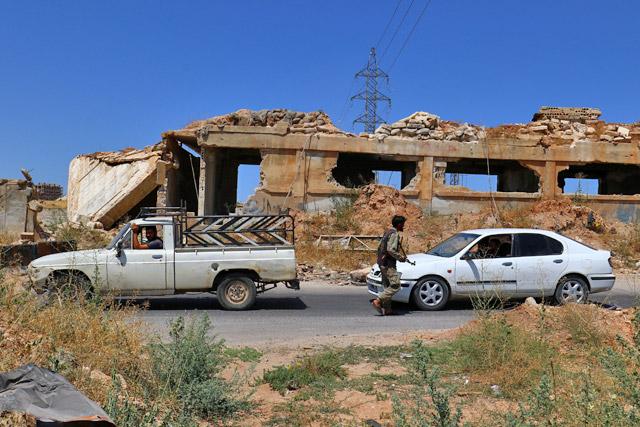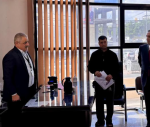You are here
Syria rebels lose heavyweight with collapse of Islamist faction
By AFP - Aug 17,2017 - Last updated at Aug 17,2017
BEIRUT — Syria's opposition has lost one of its most powerful factions with the collapse of Islamist heavyweight Ahrar Al Sham, which once walked a fine line between extremists and more mainstream rebels.
The group has been decimated by deadly fighting, with a former Al Qaeda affiliate emerging the winner in the only Syrian province entirely beyond regime control.
Clashes between the former allies broke out in mid-July when Hayat Tahrir Al Sham (HTS) attacked Ahrar positions across the northwestern province of Idlib.
By the time a ceasefire deal was reached and the guns fell silent, Ahrar had been devastated.
"Ahrar Al Sham's defeat is a defeat for Syria's rebels broadly," said Syria analyst Sam Heller of the Century Foundation think tank.
"Inside the northwest, there's now no one who can challenge the clear, hegemonic control of Hayat Tahrir Al Sham," he said.
Nawar Oliver of the Turkey-based Omran Centre think tank said: "Ahrar Al Sham as a military force is over".
"In less than 48 hours, Ahrar lost its most important strategic locations to HTS, from the border crossings all the way to a number of strategic cities," he said.
The group was expelled from Idlib city, the lucrative Bab Al Hawa border crossing with Turkey and surrounding territory near the frontier including checkpoints and key roads.
Without revenues from commercial products taxed at Bab Al Hawa, Ahrar's financial resources will likely be slashed.
Its legitimacy as a governing force may also take a hit with HTS's takeover of institutions like religious courts.
Months-long decline
Analysts say the decline was a long time coming.
Founded in late 2011, Ahrar was one of the most well-organised groups battling Syrian President Bashar Assad’s government.
The conservative Islamist faction boasted an estimated 10,000-20,000 fighters and a popular base in Idlib.
In September 2014, it suffered a devastating blow when a massive blast killed most of its top leadership and gave hardliners the upper hand.
No one has ever claimed responsibility for the attack.
Ahrar fought alongside one-time Al Qaeda affiliate Al Nusra Front — now HTS — to capture most of Idlib in 2015.
But it never backed the group’s transnational extremist ideology or that of the Daesh terror group.
Instead, it was often seen as a bridge between more moderate and radical strands of Syria’s opposition.
That identity crisis was one of the reasons behind the group’s downfall, analysts said.
Ahrar’s defeat by HTS “was the culmination of a long process of Ahrar’s indecisiveness, a shaky identity, and the loss of local and regional allies”, analyst Ahmad Abazeid wrote for the Turkey-based Toran Centre.
Ahrar’s refusal to shore up other rebels targeted in recent years by extremists meant no one came to its aid when it was attacked, Oliver said.
And finally, “the complete lack of any mobilisation from the Turkish side” during the infighting isolated Ahrar from its formerly most committed external backer, he added.
‘Ostracism’
Less than two weeks after the fighting died down, Ahrar announced that a longtime Islamist dissident who spent years in regime prison would take the helm as its new leader.
In his first video address, Hassan Sawfan admitted the movement had been weakened but promised a comeback — though analysts remain sceptical.
“It’s going to be difficult for ‘the new Ahrar’ to build quickly on such weak foundations,” Oliver said.
He expected Ahrar would be gutted by further defections to rival rebels or even to HTS, “now considered the most powerful force in Idlib”.
Questions remain on what Ahrar’s defeat will mean for Idlib, now largely controlled by an extremist group that Heller said is “considered toxic and intolerable by most of the international community”.
The province’s population has swelled, with tens of thousands of people displaced there by fighting or after evacuating besieged areas in other parts of Syria.
Many receive life-saving humanitarian aid, which has continued to enter the province through Bab Al Hawa despite HTS’ power grab, a Western diplomat said.
“We don’t find that the people we’re working with or the programming we’re doing is touched by HTS,” the diplomat said.
According to analyst Aron Lund, “for now, jihadi-ruled Idlib remains uncomfortably contained and, thanks to foreign aid, barely functional”.
“Idlib’s future is now one of containment and ostracism,” he wrote for IRIN News.
Related Articles
BEIRUT — The extremist takeover of Syria's key Idlib province raises the prospect that the region could become the next target of the intern
BEIRUT — Militants on Sunday took Idlib in Syria after rival rebels withdrew, strengthening their grip over the northwestern city and its pr
BEIRUT, Lebanon — The fate of Syria's Idlib will depend on Turkey's ability to keep a lid on the extremist-dominated tinderbox and prevent a
















